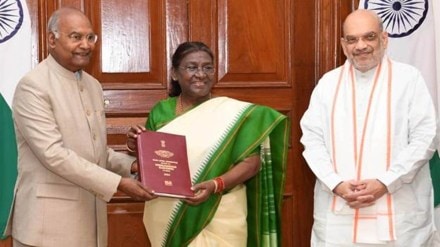The high-level committee headed by former President Ram Nath Kovind on Thursday submitted its report to President Droupadi Murmu, recommending to hold elections to the Lok Sabha and state assemblies simultaneously. The report, 21 volumes and 18,626 pages long, comes after several rounds of consultations with several stakeholders and experts and a research spanning 191 days.
Constituted in September 2023 to look into the idea of ‘One Nation, One Election’, the panel held 65 meetings in New Delhi as it referred to the findings of expert bodies, such as the Law Commission of India, the National Commission to Review the Working of the Constitution, the Department-related Parliamentary Standing Committee on Law and Justice, Niti Aayog and the Election Commission of India.
Members of the panel included Home Minister Amit Shah, former Leader of Opposition in Rajya Sabha Ghulam Nabi Azad, former Lok Sabha Secretary General Subhash C Kashyap, former chairman of the 15th Finance Commission NK Singh, senior advocate Harish Salve, and former Chief Vigilance Commissioner Sanjay Kothari. Law Minister Arjun Ram Meghwal was a Special Invitee to the Committee.
What has the Kovind panel recommended? HIGHLIGHTS
Amending the Constitution
The Constitution should be amended to enable simultaneous elections in two steps. In the first step, simultaneous elections will be held to Lok Sabha and State Assemblies. For this, no ratification by the states will be required for the constitutional amendment.
In the second step, elections to municipalities and the panchayats will be synchronised with elections to Lok Sabha and state Assemblies in such a way that local body elections are held within 100 days of the elections to Lok Sabha and state Assemblies. This will require ratification by not less than one-half of the states.
Single Electoral Roll and Election ID
For the purpose of preparation of single electoral roll and electoral photo identity cards for use in elections to all the three tiers of government, the Constitution should be amended, so that the Election Commission of India can prepare a single electoral roll and election ID in consultation with the State Election Commissions. These amendments will require ratification by not less than one-half of the states.
What happens in case of a hung House?
In the event of a hung House, a no-confidence motion, or any such event, fresh elections should be held to constitute the new Lok Sabha or state Assembly for the unexpired term of the House.
Meeting Logistics Requirements
The committee has recommended that for meeting logistical requirements, the Election Commission of India will plan and estimate in advance, in consultation with the State Election Commissions, and take steps for the deployment of manpower, polling personnel, security forces, EVMs/VVPATs, etc., so that free and fair simultaneous elections are held in all the three tiers of the government.
The committee said in its report that it was of the unanimous view that simultaneous elections will bring fundamental transformation in the electoral process and overall governance. “It will result in optimising scarce resources and also encourage voters to participate in the electoral process in larger numbers. Disruptions to governance and policy paralysis resulting from the application of the Model Code of Conduct and its adverse impact on economic growth will be mitigated,” it said.
“Considering its overriding advantages, the Committee is of the unanimous opinion that there should be simultaneous elections in the country. Accordingly, necessary amendments to the Constitution and other relevant laws may be brought by the government,” it added.
